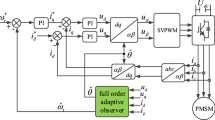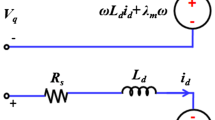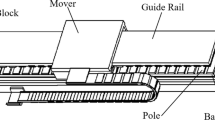Abstract
An adaptive interconnected state observer is proposed for the permanent magnet linear synchronous motor (PMLSM) with both unmeasurable state variables and external disturbances. The tracking controller without speed measurement is given via backstepping control method. The stator resistance that varies with the environment is taken as the extended state of one subsystem, and the total disturbance of the mechanical subsystem is as another extended state of the other. The system is transformed into the form of interconnected subsystem. An adaptive interconnected state observer based on Kalman filter is designed to estimate the unmeasurable state and the external disturbance of the system. The controller is designed to realize the sensorless speed tracking control. The simulation results shows the effectiveness of the proposed control scheme.
Similar content being viewed by others
References
Q. F. Lu, Y. M. Shen, and Y. Y. Ye, “Development of permanent magnet linear synchronous motors structure and research,” Proceedings of the CSEE, vol. 39, no. 9, pp. 2575–2588, 2019.
H. Wang, B. Zhou, X. Li, H. Zhang, Q. Li, and D. Han, “Study on development trend and application status of linear motor,” Micromotors, vol. 49, no. 9, pp. 86–92, 2016.
A. Glumineau and J. de L. Morales, Sensorless AC Electric Motor Control-Robust Advanced Design Techniques and Applications, Springer, International Publishing Switzerland, New York, 2015.
M. Ezzat, J. de Leon, and A. Glumineau, “Sensorless speed control of PMSM via adaptive interconnected observer,” International Journal of Control, vol. 84, no. 11, pp. 1926–1943, 2011.
R. Marino, S. Peresada, and P. Tomei, “Global adaptive output feedback control of induction motors with uncertain rotor resistance,” IEEE Transactions on Automatic Control, vol. 44, no. 5, pp. 967–983, 1999.
M. Montanari, S. Peresada, and A. Tilli, “A speed-sensorless indirect filed-oriented control forinduction motors based on high gain speed estimation,” Automatica, vol. 42, no. 10, pp. 1637–1650, 2006.
M. Ghanes, J. de Leon, and A. Gulumineau, “Cascade and high gain observers comparison for sensorless closed-loop induction motor control,” IET Control Theory and Applications, vol. 2, no. 2, pp. 133–150, 2008.
R. Marino, P. Tomei, and C. M. Verrelli, “An adaptive tracking control from current measurements for induction motors with uncertain load torque and rotor resistance,” Automatica, vol. 44, no. 10, pp. 2593–2599, 2008.
H. Kim, J. Son, and J. Lee, “A high-speed sliding-mode observer for the sensorless speed control of a PMSM,” IEEE Transactions on Industrial Electronics, vol. 58, no. 9, pp. 4069–4077, 2011.
M. M. Gaballah, M. E. Bardini, and M. Sharaf, “Chattering-free sliding mode observer for speed sensorless control of PMSM,” Applied Computing and Informatics, vol. 13, no. 2, pp. 169–174, 2017.
M. Comanescu, L. Xu, and T. D. Batzel, “Decoupled current control of sensorless induction motor drives by integral sliding mode,” IEEE Transactions on Industrial Electronics, vol. 55, no. 11, pp. 3836–3845, 2008.
T. T. Gao, “A sliding-mode observer design for the unknown disturbance estimation of a PMSM,” Proc. of the 27th Chinese Control and Decision Conference, Qingdao, pp. 5851–5855, 2015.
Z. Qiao, T. Shi, Y. Wang, Y. Yan, C. Xia, and X. He, “New sliding-mode observer for position sensorless control of permanent-magnet synchronous motor,” IEEE Transactions on Industrial Electronics, vol. 60, no. 2, pp. 710–719, 2013.
S. Chi, Z. Zhang, and L. Xu, “Sliding-mode sensorless control of direct drive PM synchronous motors for washing machine applications,” IEEE Transactions on Industrial Electronics, vol. 45, no. 2, pp. 582–590, 2009.
Y. Zhao, W. Qiao, and L. Wu, “An adaptive quasi-sliding-mode rotor position observer-based sensorless control for interior permanent magnet synchronous machines,” IEEE Transactions on Power Electronics, vol. 28, no. 12, pp. 5618–5629, 2013.
M. Boussak, “Implementation and experimental investigation of sensorless speed control with initial rotor position for interior PMSM drive,” IEEE Transactions on Power Electronics, vol. 20, no. 6, pp. 1413–1422, 2005.
Y. Park and S. K. Sul, “Sensorless control method for PMSM based on frequency adaptive disturbance observer,” IEEE Journal of Emerging and Selected Topics in Power Electronics, vol. 2, no. 2, pp. 143–151, 2014.
B. Du, S. Wu, S. Han, and S. Cui, “Application of linear active disturbance rejection controller for sensorless control of internal permanent-magnet synchronous motor,” IEEE Transactions on Industrial Electronics, vol. 63, no. 5, pp. 3019–3027, 2016.
J. Q. Han, “From PID to active disturbance rejection control,” IEEE Transactions on Industrial Electronics, vol. 56, no. 3, pp. 900–906, 2009.
C. Pukdeboon, “Extended state observer based third-order sliding mode finite-time attitude tracking controller for rigid spacecraft,” Science China Information Sciences, vol. 62, no. 1, pp. 1–16, 2019.
S. Mobayen and S. Javadi, “Disturbance observer and finite-time tracker design of disturbed third-order nonholonomic systems using terminal sliding mode,” Journal of Vibration and Control, vol. 23, no. 2, pp. 181–189, 2017.
S. Mobayen and F. Tchier, “Nonsingular fast terminal sliding mode stabilizer for a class of uncertain nonlinear systems based on disturbance observer,” Scientia Iranica, vol. 24, no. 3, pp. 1410–1418, 2017.
L. Cao, B. Xiao, and M. Golestani, “Robust fixed-time attitude stabilization control of flexible spacecraft with actuator uncertainty,” Nonlinear Dynamics, vol. 100, pp. 2505–2519, 2020.
S. M. Smaeilzadeh and M. Golestani, “Finite-time fault-tolerant adaptive robust control for a class of uncertain non-linear systems with saturation constraints using integral backstepping approach,” IET Control Theory and Applications, vol. 12, no. 15, pp. 2109–2117, 2018.
W. H. Chen, “Disturbance observer based control for nonlinear systems,” IEEE/ASME Transactions on Mechatronics, vol. 9, no. 4, pp. 706–710, 2004.
M. A. Hamida, J. D. Leon, A. Glumineau, and R. Boisliveau, “An adaptive interconnected observer for sensorless control of PM synchronous motors with online parameter identification,” IEEE Transactions on Industrial Electronics, vol. 60, no. 2, pp. 739–748, 2013.
M. A. Hamida, J. D. Leon, and A. Messali, “Observer design for nonlinear interconnected systems: Experimental tests for self-sensing control of synchronous machine,” The International Journal of Advanced Manufacturing Technology, vol. 105, pp. 1041–1054, 2019.
H. Ma, H. R. Ren, Q. Zhou, R. Q. Lu, and H. Y. Li, “Approximation-based nussbaum gain adaptive control of nonlinear systems with periodic disturbances,” IEEE Transactions on Systems, Man, and Cybernetics: Systems, vol. 52, no. 4, pp. 2591–2600, 2022.
H. R. Ren, R. Q. Lu, J. L. Xiong, and Y. Xu, “Optimal estimation for discrete-time linear system with communication constraints and measurement quantization,” IEEE Transactions on Systems, Man, and Cybernetics: Systems, vol. 50, no. 5, pp. 1932–1942, 2020.
D. Z. Zheng, Linear System Theory, 2nd ed., Tsinghua University Press, Beijing, 2002.
Author information
Authors and Affiliations
Corresponding author
Additional information
Publisher’s Note
Springer Nature remains neutral with regard to jurisdictional claims in published maps and institutional affiliations.
This work was supported by the National Natural Science Foundation of China under grant number 62003148, Key Laboratory of Measurement and Control of Complex Systems of Engineering (Southeast University), Ministry of Education under grant number MCCSE2021A05 and China Postdoctoral Science Foundation under grant number 2021M691277.
Kang Wu received his B.S. degree in electrical engineering from Kwangwoon University, Korea, in 2013, an M.S. degree form Newcastle University, United Kingdom, in 2014, and a Ph.D. degree from Southeast University, in 2019. Currently, he is a lecturer at the School of Internet of Things Engineering, Jiangnan University. His research interests include nonlinear control, adaptive control, and motion control.
Ying Lin received her B.S. degree from Liaoning Technical University, China, in 2019, an M.S. degree from the College of Engineering from Qufu Normal University, China, in 2021. Currently, she works at Huaneng Jinling power plant. Her reserch interests include nonlinear control and permanent magnet synchronous motor system control.
Rights and permissions
About this article
Cite this article
Wu, K., Lin, Y. Sensorless Speed Control of PMLSM via Adaptive Interconnected State Observer. Int. J. Control Autom. Syst. 20, 3822–3831 (2022). https://doi.org/10.1007/s12555-021-0684-x
Received:
Revised:
Accepted:
Published:
Issue Date:
DOI: https://doi.org/10.1007/s12555-021-0684-x




